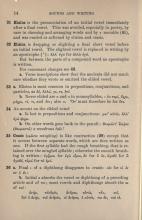32. Elision is dropping or slighting a final short vowel before an initial vowel. The slighted vowel is replaced in writing by an apostrophe (ʼ).
ἀλλʼ ἐγώ for ἀλλὰ ἐγώ
But between the parts of a compound word no apostrophe is written. For consonant changes see § 42.
a. Verse inscriptions show that the ancients did not much care whether they wrote or omitted the elided vowel.
33. a. Elision is most common in prepositions, conjunctions, and particles, as δέ, ἀλλά, γε, τε, ἐπί.
b. Never elided are α and ο in monosyllables, ι in περί, ἄχρι, μέχρι, τί, τι, and ὅτι; also υ. Ὅτʼ must therefore be for ὅτε.
34. An accent on the elided vowel:
a. Is lost in prepositions and conjunctions.
μετʼ αὐτόν
ἀλλʼ ἐγώ φημι
b. On other words goes back to the penult.
θαυμάστʼ ἔλεξας (θαυμαστά)
a wondrous tale!

